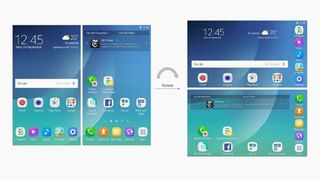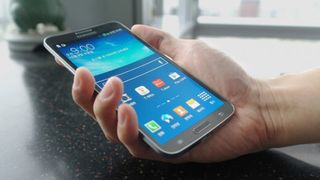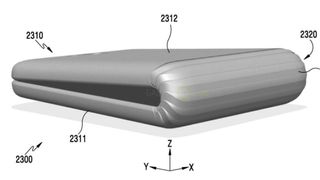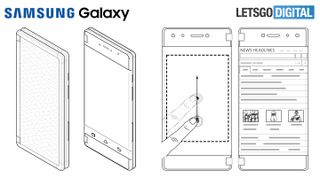The Samsung Galaxy X launch has been rumored for a few years, and the leaks continue to roll in about the firm’s fabled foldable, flexible, bendable smartphone. While we don’t have any word on an exact Galaxy X release date, we do now have an idea of when it’ll launch.
Update: A new leak suggests that Samsung’s foldable phone could have 512GB of storage and be available globally.
We’ve gone through all the flexible Samsung smartphone leaks, from the first reports of a folding phone back in 2011 to the most recent reports naming the Samsung Galaxy X directly.
Originally rumored to have the code name Project Valley, until a more recent report claimed Samsung had switched it to “Winner”. Now we’ve heard directly from the CEO of Samsung’s mobile division who has confirmed the phone – which may actually be called the Samsung Galaxy F – will be ready by the end of 2018.
There’s a lot to unpack from several years, but it now feels like we’re getting close to a Samsung Galaxy X launch date, and things are beginning to get a little clearer on what we may be able to expect.
Cut to the chase
- What is it? Samsung’s much-rumored folding smartphone
- When is it out? Before the end of 2018, but may not be on sale soon
- What will it cost? It’ll likely be one of the most expensive phones around
Samsung Galaxy X release date and price
The Samsung Galaxy X release date is now clearer as DJ Koh – CEO of Samsung’s mobile division – has said the phone will be unveiled in 2018. It’s expected the company may lift the curtain on the device as the Samsung Developer Conference from November 7.
Reports from South Korea have further confirmed the Galaxy X won’t be on sale until 2019 even though it’ll likely be announced before then. However, it may at least be globally available when it does land.
You may have to pay a lot for it too as an analyst reckons the Samsung Galaxy X price could reach ₩2,000,000 (around $1,850, £1,375, AU$2,400).
Samsung Galaxy X leaks and news
In November 2017 we got a look at the possible interface of the Galaxy X, revealing a familiarly Samsung UI, but where each half of the display shows a different screen, rather than just making everything bigger or smaller.
This interface was shown in a patent, which also gave us another look at the possible design of the phone, showing something with a laptop-like design, but a second screen where the keyboard would be.

The Samsung Galaxy X could essentially have two screens instead of one (credit: KIPRIS)
And in early 2018 an industry source claimed Samsung will likely start producing the phone – which will apparently have a 7.3-inch display – in November 2018, with a launch likely in December or early 2019. That matches what DJ Koh has since claimed, so it may be the case.
But apparently prototypes of the folding phone have already been shown off behind closed doors at CES 2018, which took place in January.
Meanwhile Samsung’s Q4 2017 financial results included claims that foldable OLED panels and phones could be a big money-maker for Samsung in 2018 and beyond – which is yet more evidence that the Galaxy X is coming soon.
In May 2018 we heard that Samsung had apparently changed the phone’s codename from ‘Valley’ to ‘Winner‘ and that the final handset will be made up of three 3.5-inch screens, which can be opened out to tablet size or folded like a book.
Apparently the screens for this device will be ready by November 2018 and Samsung has created a curved battery for the phone with a capacity of between 3,000mAh and 6,000mAh, while the phone itself could land in February 2019, possibly during MWC.
That’s a rumor that we’ve now heard more than once, though as with everything Galaxy X-related we’d take it with a huge helping of salt.
Most recently we’ve heard that the Samsung Galaxy F – which could be the launch name for the phone – will have 512GB of storage, dual-SIM support, and the model number SM-F900U. Apparently the firmware is also in testing, which suggests it’s coming soon.
Samsung Galaxy X: 8 years in the making
The idea of a foldable phone isn’t new to Samsung, in fact way back in 2011 the company showed off a prototype of exactly that.
The device looked chunky and awkward, but even back then it somewhat worked, remaining intact after 100,000 folds, with only a 6% drop in brightness at the center, where all the folding action happened.

A foldable phone (not the Galaxy X) shown off by Samsung in 2011
This clearly wasn’t a commercial product, but later that year Samsung launched a concept video (see it below) of a fully bendable (and transparent) mobile device.
It could fold out from a phone-sized screen to a tablet-sized one, showing Samsung’s ambitions for the technology. Now, technology hasn’t advanced quite this far, so don’t expect the Samsung Galaxy X to be just a folding screen – but the vision is an interesting one.
While a device like the one in the video above is still years away, by 2012 Samsung was already hard at work trying to launch the first generation of flexible or foldable phones, but a report late in the year claimed that problems with the production of flexible screens would hold the first bendy display back until at least 2013.
That didn’t stop Samsung showing off another video of a foldable future though, highlighting all sorts of transparent screens, made from plastic that’s thin, light and flexible enough to fully fold or roll.
And as 2012 came to a close it seemed Samsung might be overcoming its production problems, with another report claiming that its flexible plastic screens were in the final stage of development, with the first phones sporting them likely to land in mid-2013.

Samsung’s foldable display on stage at CES 2013 (credit: Engadget)
Samsung’s bendy plastic screens got a more real-world debut at CES 2013, along with a name – they were now called ‘Youm’, though it was clear from the flexible prototype on show that Samsung was still far from putting a Youm display on a commercial device.
That was made even more clear when the tech was reportedly hit with new manufacturing issues in April 2013.
Supposedly the previous problems had been solved, but now Samsung was apparently struggling with the encapsulation technology, which protects the screen from moisture and air damage.

The Samsung Galaxy Round – the starting point for the Samsung Galaxy X?
The closest thing we actually got to a foldable phone from Samsung in 2013 was the Samsung Galaxy Round. This was far from the prototypes and concepts we’d seen, but as the world’s first curved screen smartphone it was a big step in the right direction.
That was followed up by the Samsung Galaxy Note Edge, which curved in a now more familiar direction, one which Samsung has since fully embraced and features in its latest flagship handsets including the Galaxy Note 9, Galaxy S9 and S9 Plus.
These are still far from being foldable, and while a Samsung executive did promise a truly bendable device by the end of 2014, whatever he was referring to never appeared.
Talk of foldable phones went a bit quiet until mid-2015, when it was rumored that an upcoming phone codenamed Project Valley could be foldable.
At this point little was known about the device, which would apparently have two screens, but it was said to be in early development, so was unlikely to arrive for a while, if at all.
In September 2015 an “insider” claimed that we’d see a bendable phone in January 2016. It wasn’t clear whether this was Project Valley or not, but apparently it would come in both mid-range and high-end flavors. Though, of course, it didn’t arrive at all.
In May 2016 Project Valley got a new name – the Samsung Galaxy X, which was believed to be the name it would release under.
According to reports at the time it would be ready for release in 2017 and would have a foldable 4K display, so that the resolution would remain high even when the phone was folded.
We were sceptical about that launch date at the time, and were right to be, as we’re now in 2018 with no sign of it.

Samsung’s roll-up, non-touch display at SID 2016
But that’s not quite the full story so far. At SID 2016 Samsung showed off a roll-out display (above) – but one which didn’t have a touchscreen layer, which would be pretty vital for a smartphone.
Then in June 2017 “people familiar with the matter” reported that we might see two foldable phones from Samsung in 2017 – backing up those previous Galaxy X reports.
Supposedly one would fold out from a 5-inch handset to an 8-inch tablet, much like the concept video Samsung showed back at the beginning of our story, while the other would fold in half like a cosmetic compact, along the lines of a folding phone patent we’d already seen.

This 2017 launch didn’t happen, but Samsung was clearly on the right track, with another patent looking to solve one of the biggest problems with folding phones – the ability to fold without damaging any internal components.
The patent described an “artificial muscle”, which would move in time with the screen bending to protect other components.

Is this the Samsung Galaxy X? (credit: GalaxyClub)
We’ve seen plenty of early glimpses that claim to show off the Samsung Galaxy X. One came from a patent spotted by GalaxyClub, highlighting a long device, with a shape more like a remote control than a smartphone, but one which could fold down to half the size.
The shape doesn’t seem particularly practical, so we doubt this is the form the Galaxy X will take, but it’s vaguely along the lines of the phone-to-tablet convertible we’ve been hearing about, and a similar design has popped up since.

One of the more recent bits of information that may point to the foldable X looks different than previous info. Much like the ZTE Axon M that came out in 2017, images from the patent filing (shown above) show off a bezel-licious device that folds in a clamshell design.
According to some sources, more than 100,000 units were going to roll out in the third quarter 2017 – though they added that plans for a 2017 launch could apparently be changed, which has clearly happened if any such plans ever existed.
And Samsung GALAXY X in Q3. 🙂29 March 2017
That gelled with a tweet from tipster @mmddj_china, who claimed the Galaxy X would land in Q3 of 2017 – which again, obviously, did not happen.
Elsewhere we were hearing that Samsung would only have a prototype ready by then, and supply chain sources speaking to DigiTimes said that a small production of foldable handsets would be made in Q4 of the year, but technical issues may mean we wouldn’t see mass production before mid-2018 – yet another false prophecy.
Other sources similarly said that several thousand dual-screen prototypes might land in 2017, but that a commercially available product wouldn’t.
One of Samsung Display’s own engineers has claimed we haven’t seen a foldable phone yet “ecause the bezel-free display currently sells well, we still have enough time to develop foldable display. The technology is expected to be mature around 2019.”
Although more recent news comes direct from Samsung’s mobile boss, and is a little better, as he claimed the company was aiming for a 2018 launch, assuming it could overcome certain unspecified problems. Though he’s since slightly backtracked on those claims.
More recently still he’s said that rather than being the first the company’s goal is to make meaningful products and “roll out new products worth paying for”, so it sounds like we might still be waiting a while for the Samsung Galaxy X if their aim is to make it polished.